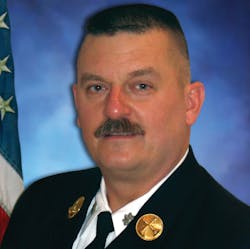Hearing the word “danger” immediately causes most of us to slow down, become cautious and look around. These all are good reactions regardless of what condition it is that’s exposing us to a danger.
Danger, in the fire service, often is a warning of something or some condition that can injure or kill us. The list of dangers that firefighters face when operating is long. It includes a danger of a fall, of an electrical shock, of being injured by a machine and of getting lost in a burning building. The process that we can follow to deal with dangers is relatively simple.
Recognition
The first and most obvious step in dealing with danger is identifying it. Many of us witnessed citizens walk right into a ladder that stood on a sidewalk or move an energized electrical wire to pass it. Firefighters sometimes act similarly. Before we can avoid or deal with dangerous conditions, we must be able to recognize them. We must train our people to keep their eyes open and to practice “situational awareness.” These lessons can be conducted at operations when the condition becomes apparent, during a post-operational discussion and during daily routine trainings.
Evaluation
After recognition comes evaluation: quickly scrutinizing the condition to decide whether any action is required. The action simply could be to verbally warn the firefighters who are walking behind you to “Watch out” for the small hole in the floor that you are passing, or it could be a shout to “Stop!” so none of your people walks into a much larger hole that would cause serious injury. It could be you urging a firefighter who is cutting with a saw to quickly complete the cut, so you could move your company off of the roof that’s getting a little soft, or it might be an urgent order to all members who are on a roof to immediately evacuate the roof, because it’s about to collapse.
Every condition is different, and every firefighter’s experience and training are different, too. Two firefighters who experience the same condition might react differently, and they both could be correct.
Planning
After recognizing and evaluating a dangerous condition, it must be dealt with. Yes, action that you take might differ from the action that another takes, but it shouldn’t be random. Firefighters should be trained in dealing with dangerous conditions, and procedures should be established.
Training to deal with danger is difficult but necessary. Again, remember that there often is a variety of ways to handle different situations, but they all should be based on training. For example, an engine arrives at a single-story house fire and, as the hoseline is stretched to the front door, the officer notices that the power line to the house burned and fell onto the grass. How is this handled? This officer quickly orders his nozzle team to stretch clear of the line and continue with their operation. At the same time, he notifies all on-scene personnel of the situation (danger) via radio. Could this be handled differently? Sure. Another officer who faces the same situation could order his nozzle team to stretch into the side door instead of the front door and order a third firefighter to place cones around the wire. Both actions are correct; both will, to some degree, handle the situation; and both are outlined in the department’s training manual.
Now, don’t think that every situation and solution could be addressed in training materials. What other body of knowledge is useful to deal with danger? Experience. A firefighter who has 25 years on the job crawls over a section of flooring that just doesn’t feel right. He immediately stops and waves other team members around that area. He drops plywood over the area and moves on. This isn’t in written procedures, but it will work.
Dealing with danger is necessary and important to the work that firefighters perform. Well-trained people, along with years of experience and practice, can help us to limit or eliminate the effects of dangerous conditions.
About the Author
John J. Salka Jr.
Battalion Chief
JOHN J. SALKA JR., who is a Firehouse contributing editor, retired as a battalion chief with FDNY, serving as commander of the 18th battalion in the Bronx. Salka has instructed at several FDNY training programs, including the department’s Probationary Firefighters School, Captains Management Program and Battalion Chiefs Command Course. He conducts training programs at national and local conferences and has been recognized for his firefighter survival course, “Get Out Alive.” Salka co-authored the FDNY Engine Company Operations manual and wrote the book "First In, Last Out–Leadership Lessons From the New York Fire Department." He also operates Fire Command Training, which is a New York-based fire service training and consulting firm.

